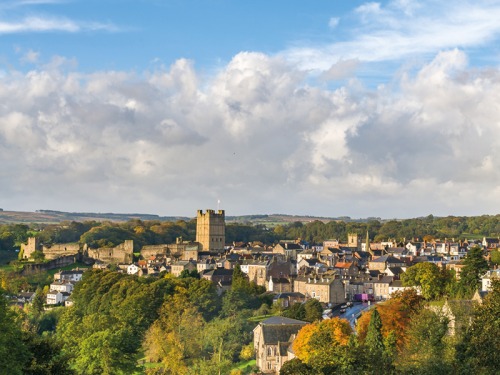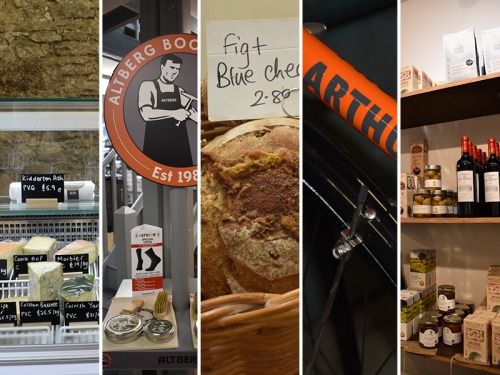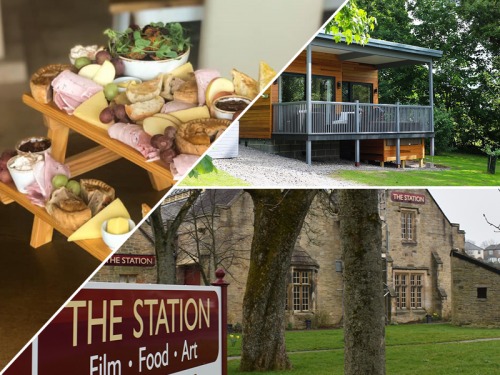Get to know Richmond’s Family Boot Makers Altberg
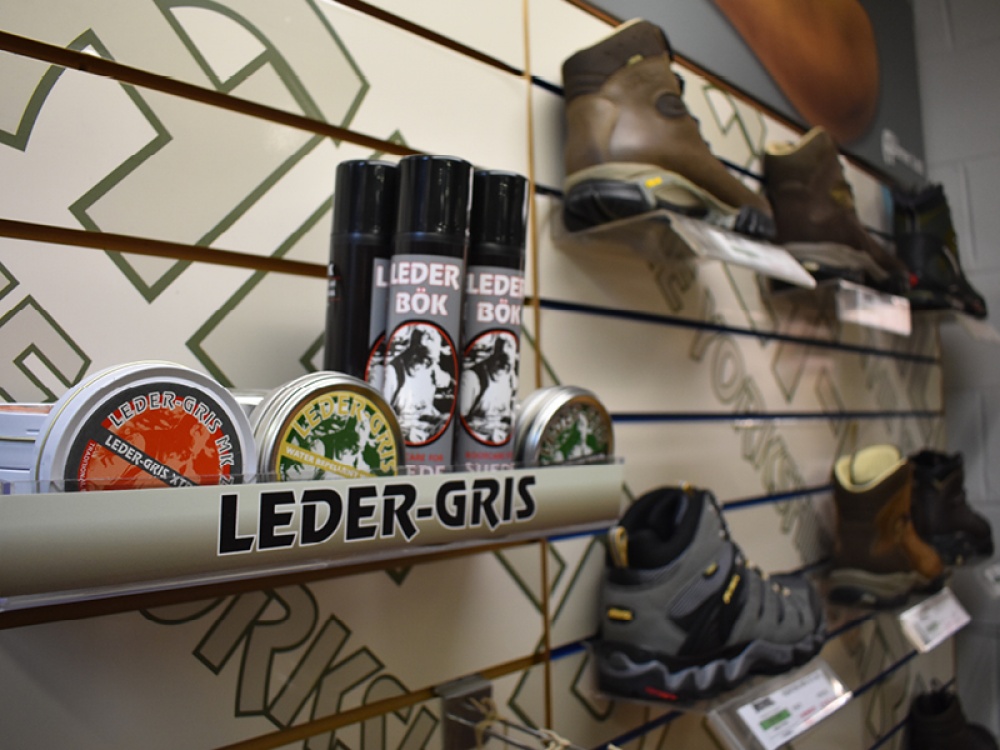
A father and son in Richmond tell us how they turned a little into a lot to continue the tradition of boot making
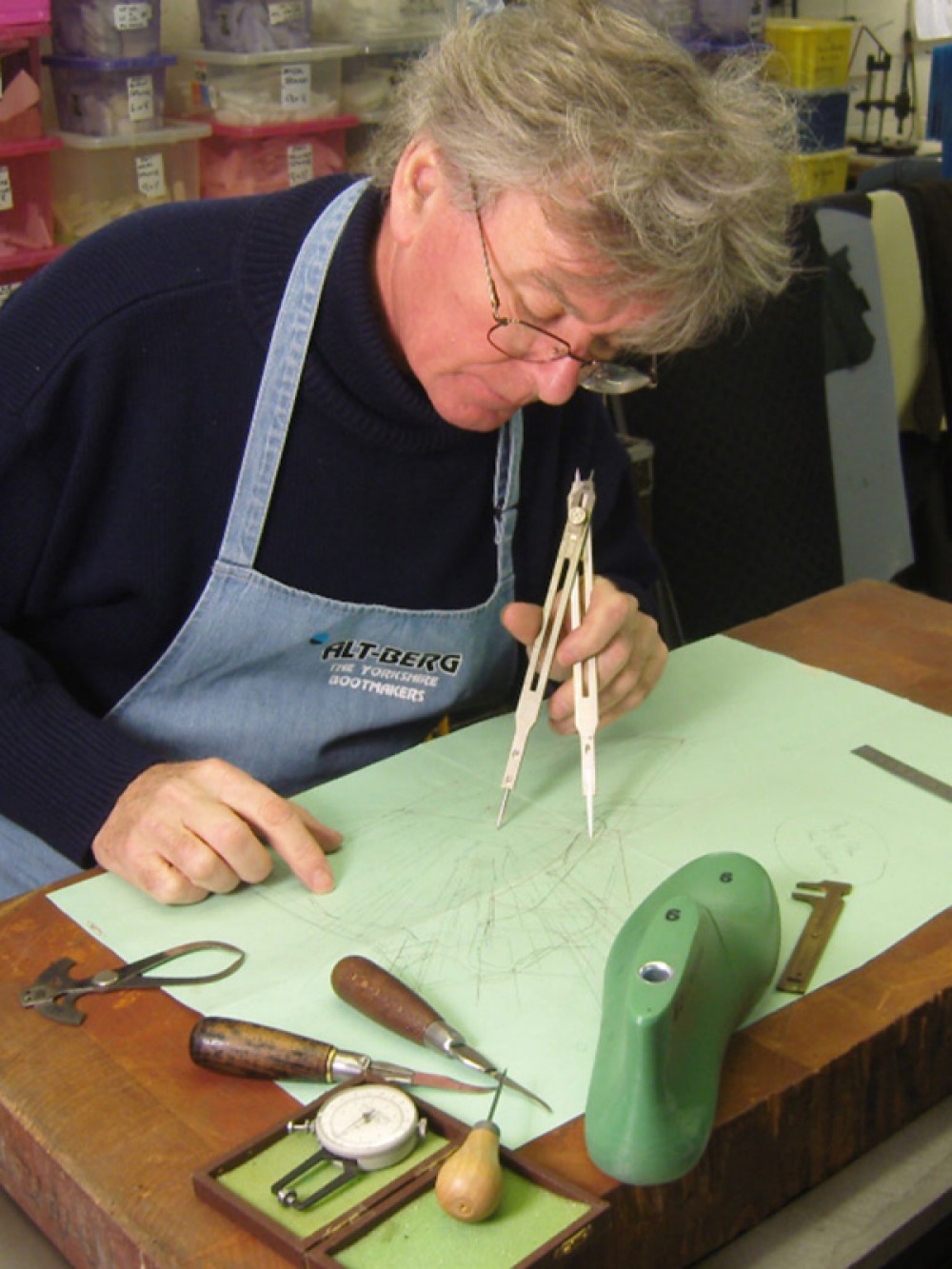
Tell us a bit about your business, yourself and what you do.
Joe: We make a range of boots from walking boots and motorcycle boots to police boots and military boots. We make specialist boots and stock items which we supply to a network of retailers. The custom-made boots are supplied through our factory shop in Richmond on the trading estate, whereas the more standard stock items are made from our factory in Italy. This is split by quantity. Although you might think we’re a factory in Richmond, we’re more like a small workshop. We don’t really make more than 10 or 20 pair batches, whereas in Italy we make 100 pairs of one style. Also in Richmond, we do the resoling. All of our boots are resolable which is good for a few different reasons: it makes us more sustainable but also gives your boots a new lease of life providing they’ve been well looked after and the leather’s in a good enough condition. We’re a true Richmond company. We started here and we’re still based here and all of our boots are designed and developed here. Even all the boots made in Italy come here where they’re allocated to customers.
Day to day, what happens here in the workshop? How are things made?
Joe: Days can be quite varied. One day we might be making new boots, the next we could be resoling, and the next we could be working on batches. One of the nice parts is that nobody in the business has one set job. Everybody who works here is really flexible. In that sense, no day is the same. That’s one of the key parts of running a small business – being flexible in the way you work.
Why is it important for you to stay in Richmond?
Joe: We’re still very much a small family business. We do have a good network throughout the UK and on the internet but we still very much have the ethos of a small family business. The business is now run by myself and my sister and, a lot of the people who work here, I’ve known since I was three or four years old. Why Richmond? It’s my home town. I’ve grown up here. My parents raised a family here. It’s very close to the Yorkshire Dales where some of my extended family are from. When my dad’s first factory closed, I was two or three years old and my dad was in his 40s and didn’t really want to leave. It’s not some sort of great business idea. We love it here, so why move?
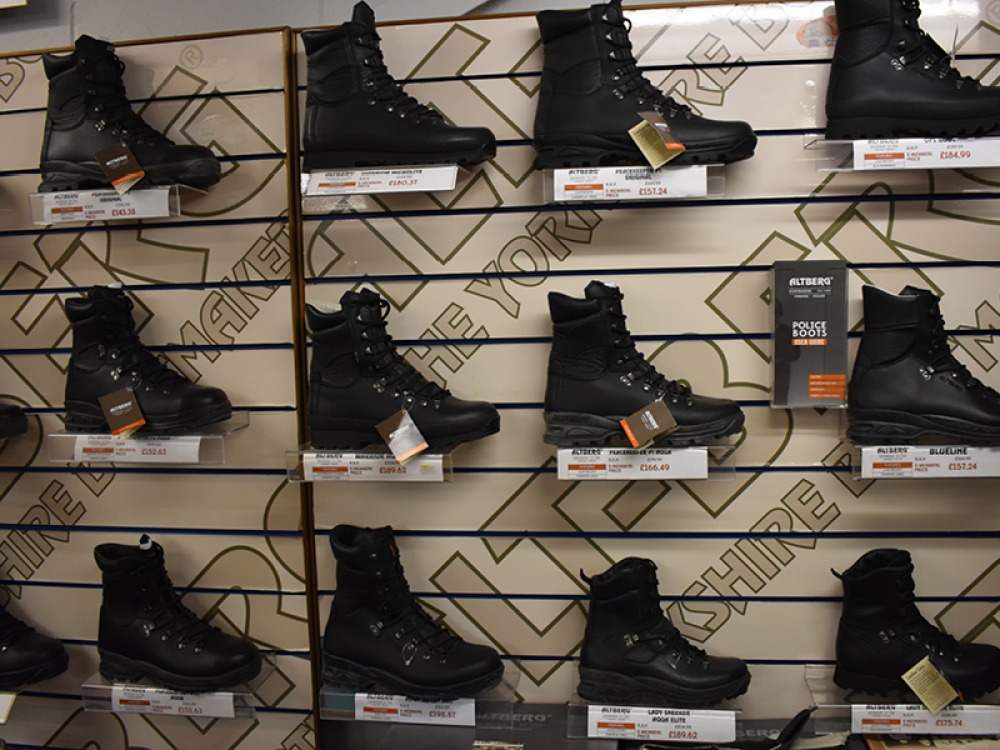
Tell us about Altberg’s first walking boots.
Mike: I’d been making fashion footwear and my hobbies were hiking and motorcycles, and I used to go to auctions to pick up leather and other items. One Christmas, we were pretty desperate and I didn’t want to lay anybody off, especially just before Christmas, so to keep them in work we decided to make black walking boots with the black leather and red laces I had. We put them in a little factory shop, nowhere near as big as this, just to see if I could sell them to people. Anyway, blow me, chaps from the army started coming in, and they started buying them. They were asking me to make the boot with a higher leg. I said “why do you want to buy these boots when you get them given for nothing?” But they said they didn’t like the boots they were given, so I made this boot with a higher leg and they were over the moon.
Where do the police boots come in?
Mike: The police started picking up on the same boots. There was one boot which I made for the RAF regiment at Leeming; they wanted a very lightweight boot for their active work, balancing and climbing. All the forces came together for the Peacekeeper Challenge, so I made them the boot and called it the Peacekeeper. I never gave it a second thought but the police picked up on that because they are “peace keepers”. All the specialist police dog handlers and those who were not necessarily on the beat but were out doing more rural activities needed a better boot. Things were looking up. We were keeping the factory busy and everyone was working. I’m not sure I was making profit, but everyone was busy. Then, blow me, the next thing I know (because the police boots became popular), the North West region of the police entered a contract to supply the police. I said, “don’t be ridiculous, do you know how big you are? It’d be about 5,000–6,000 boots. At the moment, I’m not making that many in a year.” They said they’d work with me so I went down to a company in North Shilton and they started making for me. Working between the two factories, that was working really really well. The police were happy, we were happy and it was good for the business.
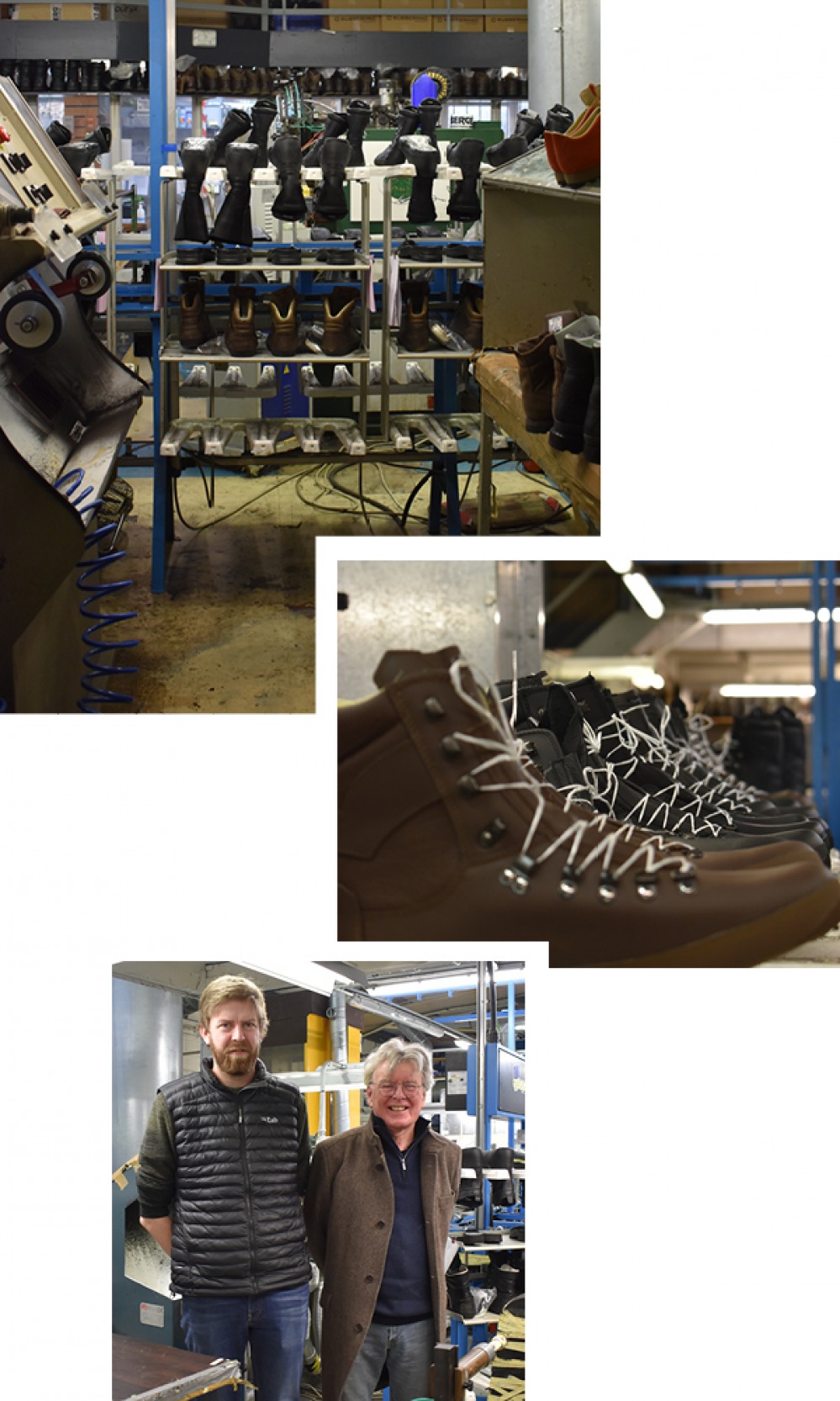
Then you went to Italy?
Mike: I’d looked all over the UK and by then all the factories were just about wiped out. I had good contacts in Italy but no one was really making the sort of stuff we use. I went to Italy and after a few weeks over there, I’d almost given up. People would say “give us the order and we’ll make the boots”, but I’d say “no. I want to be in the factory and I want to make the boots". Most of them weren’t happy with me doing that, until there was one factory I found in the north of Italy and there was only three people left who were trying to keep the business going, but didn’t have all the boot making skills. I think they were pretty much out of money, and they had no orders. Fortunately, by then, I’d made a bit of money, and I certainly had the boot making skills and the orders, so I said let’s work together. That factory is still running now. That means when we need something in this factory, I have access to it. That's really how I was able to get my police boots going again, and meant I hadn’t let them down. For my sins, I go and watch Middlesbrough sometimes but I hate it when the crowd stop being behind their team. It’s the same in business too. It’s amazing how it helps you when you know there are people behind you, wanting you to succeed. I was so fortunate that I had that with the police, and we still supply them. Someone said I must have had a foresight or a strategic plan, but all we did was try and get by every day.
Now Joe runs the business…
Mike: I’m so happy Joe runs the business now and wants to; he's always been keen on Altberg. That’s really lucky for me because, if I had to run it day-to-day now, I’m not sure I’d be able to. I have an office in the town so I’m still developing all the new boots, and I do a bit of marketing. Funnily enough, we never employed a salesman. We didn’t need it; people found us. I’ve avoided growing too big. I think it’s nice to stay a certain size. In that Richmond factory I used to work in, do you know how many pairs we made every week? 25,000. That’s 5,000 pairs of shoes everyday. I wouldn’t want to go back to that! I often say you could drop me down in a desert island and I’d probably made sandals out of palm leaves, and I’d be just as happy making these as I am making them. That’s what I enjoy, and I’m lucky I’m still able to do it.
What are the most popular walking boots and where should people walk?
Joe: Our most popular walking boots for lightweight walking I would say are the Malham – more of a two to three season walking boot, or the Fremington. For that kind of boot you might go from outside the factory, down the back of the racecourse, round through Applegarth or through the plantation. Or you might go through Easby Abbey. We also make three season boots which might be more suitable for mountainous walks or heavy walk through Swaledale, Wensleydale or even further over into the Lake District, but for the Richmond area the most popular boots are the Malham and Fremington. Our favourite area to walk is probably out of here and towards Applegarth.
Find out more about Altberg at altberg.co.uk.




